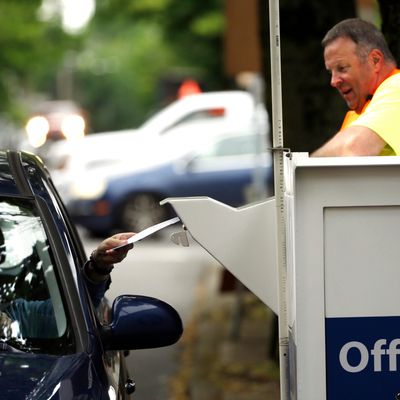
The president’s serial temper tantrums about states encouraging voting by mail seem to suggest some sort of national Democratic drive to “rig” elections by letting people vote remotely in a way that makes election fraud certain or very likely. Since he’s voted by mail himself, though, and states have a wide array of laws governing such procedures, it’s sometimes hard to discern what exactly he wants, other than another reason to rile up his base. Here’s the closest we have to a statement of policy:
On another occasion, Trump acknowledged that mail ballots should not be limited to the physically disabled or people like himself:
But generally speaking, any charitable effort to find the president’s views coherent would suggest that he generally opposes voting by mail, but thinks certain exceptions to the rule can be made for those who find voting by mail impossible or very difficult (not including, unfortunately, people worried about getting sick and dying from COVID-19).
Instead of engaging in a critique of the president’s rather atavistic position (the trend among states is moving rapidly away from it), I would simply observe that before much of anyone outside epidemiological circles had heard the word “coronavirus,” fully 34 states allowed for no-excuse voting by mail (even if the mail ballots in question were still called, as they generally are in most states, “absentee ballots”). Of those, 12 were state governments entirely controlled by Republicans, 12 by Democrats, and the other 10 had split partisan control. So the idea that this was a device that one party favored and the other party opposed, or that represented one party’s raid on election integrity, is plainly not very widely shared. That’s particularly true in this pandemic year, when 11 of the 16 states have waived the sort of limitations that Trump favors. So all told, 45 states are defying Trump’s wishes.
Yes, different states limit or manage voting by mail in different ways, and Trump has fixated on efforts to expand voting by mail in places where it already existed. He pitched a fit over a Democratic secretary of state in Michigan mailing ballot applications to all registered voters (as did Republican secretaries of state in Iowa, Georgia, Nebraska, and West Virginia) as though that was a huge break with tradition. But aside from the fact that ten states do that routinely, in many more, political parties and advocacy groups are allowed to mail the applications to their target lists (typically those who voted in one party’s primary or another). Trump is defending a system that basically doesn’t exist anymore.
This reality, of course, raises another question: With so many states now encouraging voting by mail, shouldn’t all the fraud we’ve been told it encourages have been rampantly evident by now?
Perhaps some attendant state practices are debatable if you want to reduce the risk of fraud from nugatory to nonexistent. Republicans love to freak out over letting third parties collect signed and sealed mail ballots, a practice they call “ballot harvesting” (though the one recent case involved a Republican campaign in a state where third-party ballot collection was illegal). Election-law expert and vote-by-mail enthusiast Rick Hasen points to Colorado’s limit on how many ballots a “harvester” can collect as a reasonable precaution. Many prominent Republicans in 2018 raised lurid suggestions of fraud because late mail ballots in California changed the outcome of key congressional races. Maybe the GOP should stop fighting large-scale federal assistance to state election officials, and instead help them get the resources to process mail ballots more rapidly, and also to check mail-ballot signatures against registration records more carefully (the most important safeguard against fraudulent abuse of voting by mail).
In any event, Trump and his allies are fighting an imaginary threat on a largely anachronistic landscape and not showing any real interest in making it easier to vote or to prevent fraud. Perhaps there’s an argument for the old-school assumption that voting should happen only on a single Tuesday at locations that may or may not be convenient to people who have worked all day and have a hundred competing responsibilities. I think it’s a stupid system, but am open to persuasion. To insist on in-person voting in a year like this one is extraordinarily irresponsible and morally reprehensible. Perhaps, as I have suggested before, Trump is simply looking for pretexts to object to adverse election results. If that’s what is going on, we may have bigger problems in November than a slow count.






























